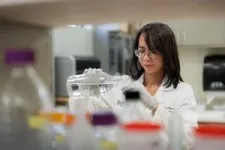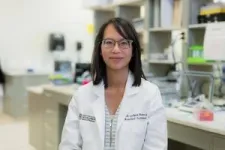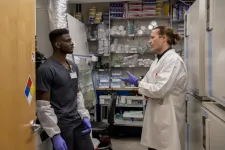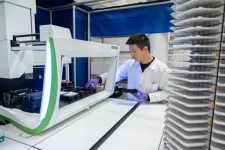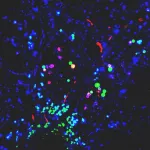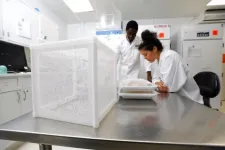To reduce the side effects associated with chemotherapy treatments, researchers have investigated the use of delivery systems that can take more drugs directly to the tumor. Ninh (Irene) La-Beck, Pharm.D., from the Department of Immunotherapeutics and Biotechnology at the Texas Tech University Health Sciences Center (TTUHSC) Jerry H. Hodge School of Pharmacy is one of those researchers.
La-Beck recently received a five-year, $2.49 million grant (“Cholesterol Metabolism in the Pharmacology of Liposomal Therapeutics”) from the National Cancer Institute at the National Institutes of Health. She said the grant will allow her to investigate how nanoparticles interact with the immune system and cancer so that new drug delivery systems can be developed.
Transporting drugs to a tumor via nanoparticles, which are about the size of a virus particle, is one of the most promising delivery methods for overcoming chemotherapy issues. One such nanoparticle delivery system uses liposomes to transport the drugs to the target tumor. Liposomes are artificial orb-like sacs typically created from cholesterol and natural non-toxic phospholipids (lipids whose molecules include a group of phosphates).
“The thing that's really attractive with using a nanoparticle in cancer treatments is that the nanoparticle is much larger than chemotherapy molecules,” La-Beck said. “Because it's larger, it is less likely to leak out and go to other healthy tissues, so it potentially causes fewer side effects.”
Drug delivery via nanoparticles such as liposomes increases drug accumulation in the tumor while sparing normal tissue. La-Beck said several liposomal chemotherapies are approved to treat cancer, but unfortunately, lipid nanoparticles such as liposomes also interact with the immune system, though their impact on the tumor’s immunologic environment is largely unknown.
Unlike normal blood vessels in the body, tumor blood vessels leak and grow rapidly with the tumor. La-Beck said the leakiness allows the nanoparticles to enter the tumor while bypassing normal tissue.
“Every time the heart pumps, more of the drug leaks out from the blood vessels and into the tumor tissue where it accumulates over time,” La-Beck said. “This means the concentration of the chemotherapy increases, and we think that helps the drug to work better.”
Several nanoparticles are now approved for delivering cancer treatments, and nearly all of them have been shown to produce better safety profiles. For example, doxorubicin, one of the drugs commonly used to treat breast cancer, causes significant heart toxicity, so there's a limit to the maximum dose a patient can receive.
“Some patients have pre-existing heart conditions, and they can't even get doxorubicin,” La-Beck said. “But we’ve found that when we put it into a nanoparticle, there's very little heart toxicity, so it's very successful in that respect. The problem is that we don't actually see the improvement in efficacy that we anticipated; we see better safety, but we don't see better efficacy. Why is that if we're supposedly getting more of the chemo into the tumor?”
In previous research, La-Beck demonstrated that liposomes composed of phospholipids and cholesterol, similar to those used in patients, doubled tumor size in mice by suppressing their immune response against some tumors. She recently identified macrophages (cells that detect, ingest and destroy harmful organisms) as the cells that are responsible for these detrimental effects.
In addition, preliminary data generated by La-Beck show that liposomal cholesterol is metabolized into oxysterols (cholesterol derivatives produced by oxidation) that are known to alter macrophage functions.
“Based on this, we theorize that liposomal oxysterols cause macrophages to suppress antitumor immunity and enhance tumor growth,” La-Beck added.
La-Beck’s lab has been trying to understand and address that problem by investigating what the body does to the nanoparticle, and what the nanoparticle does to the body. Several years ago they discovered that nanoparticles significantly interact with the immune system.
The nanoparticles, liposomes in this case, are recognized by the immune system, which responds to liposomes as they do to any perceived foreign pathogen. Macrophages normally consume and clear all these pathogens and then present the pathogen parts to the T-cells, another part of the immune system that provides an antigen-specific response to recognize that specific pathogen.
La-Beck said these macrophages are crucial in the initial clearing of the nanoparticles and in activating other immune responses to the nanoparticles. Her preliminary research showed that some of these responses are actually good; they cause the immune cells to make molecules that help to activate an immune response against cancer cells.
“We also discovered that some of these immune responses are bad because they stimulate molecules to be released that actually can suppress certain parts of the immune system and promote tumor cell growth,” La-Beck explained. “So, the immune system is a double-edged sword: if it's out of control, you get bad things, but if it’s right, you get the good effects.”
For this grant, La-Beck’s research will focus on the cholesterol part of the liposome delivery system. She said when the body metabolizes too much cholesterol in the wrong way, it causes other diseases like atherosclerosis and could be involved in the pathogenesis of Alzheimer's disease and other types of cancers.
“The bottom line is these nanoparticle delivery systems have a huge potential to help make treatments better, but there's a lot we don't understand about how they affect the immune system,” La-Beck asserted. “If we don't figure that out, then we can't fully exploit their therapeutic potential. That's basically what the grant is about.”
###
END

